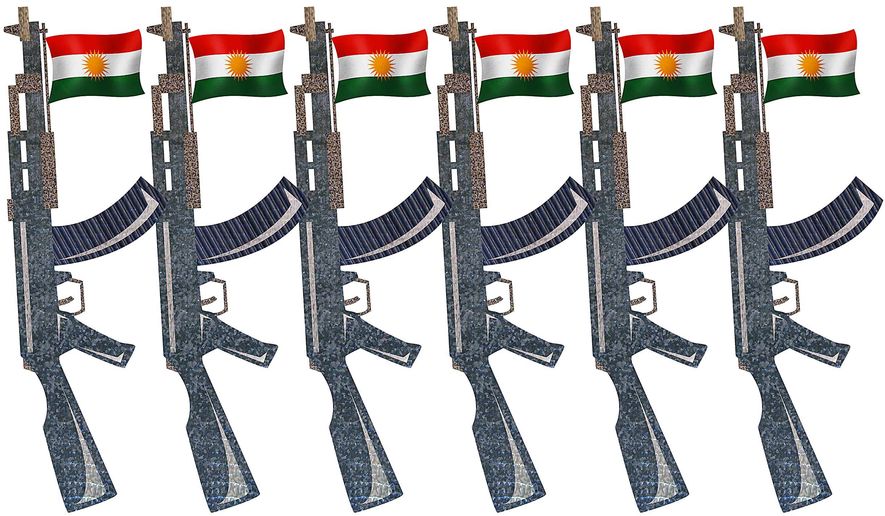OPINION:
With the ink barely dry on our Iranian nuclear deal and Tehran no friendlier to Americans than before, the time is ripe to ask the question, “Do we have any friends whatsoever in Iran?” The answer is, “yes,” and they could use a little help. It’s in our interest to do so.
“If the regime had more to worry about internally, it would have less appetite for external adventures,” said a senior source in one of the three major Kurdish opposition groups active in Iran and looking to the West for aid. He makes an important point — much of the Sunni-Arab support for the Islamic State, or ISIS, is motivated by the threat of an increasing, Iranian-Shia influence in Iraq, Syria, Yemen and portions of Saudi Arabia.
The members of these Kurdish groups have the potential to help, but if caught above ground by Iranian security forces, they are sure to be detained and very likely tortured and executed. Remarkably, that hasn’t dissuaded their members from conducting operations inside Iran. They simply wonder who’s got their back.
“Tehran has feared no international sanction,” the same source added, “That is why it felt free to violently crush the weeks-long demonstration in the city of Mahabad in May.” Those protests erupted in the Kurdish-populated city in northwestern Iran after a young, Kurdish woman leapt to her death while reportedly trying to escape an attempted rape by an Iranian intelligence officer. “And if we look back to the popular demonstrations in Tehran in 2009,” he continued, “they had potential to ignite a Persian Spring, but no one assisted them. The USA looked the other way while Tehran attacked protesters and shut down the social media the crowds were using to coordinate their actions.”
Still, the members of his group and those of the other two groups keep alive the famed, blood-deep, Kurdish refusal to submit. Case in point; the Kurdistan Freedom Party of Iran (PAK). Elements of it have recently entered Iraq to help in the fight against ISIS, and the PAK leader, Hussein Yazdanpana, is personally commanding their operations on the battlefield.
His group isn’t alone. The Democratic Party of Iranian Kurdistan (PDKI) bases 1,000 of its own peshmerga near Koya in the Kurdish north of Iraq. “They have helped fight ISIS. We can arm another 2,000 if needed,” asserted Arash Saleh, PDKI representative to the United States.
The Komala Party of Iranian Kurdistan is involved, too. “Our peshmerga are fighting alongside other Kurdish and coalition forces near Kirkuk,” said a proud Abdullah Mohtadi, the party’s secretary-general, “and we are doing so to defend Kurdistan and humanity against the evil force of Islamic terrorism.”
Back in Iran, however, the Kurdish struggle is against a repressive Tehran. “The Iranian regime has seven Kurds on death row right now,” said Arash Saleh. “Every time they add another we see more Kurds wanting to take up arms.”
Two generations ago, Iranian Kurds turned to the USSR for help. Soviet troops pressed into Iran during World War II and offered their support to the Mahabad-based predecessors of today’s Komala, PDKI and PAK. The Soviet presence inspired the Kurds to act on their dream — an independent state of their own, and with Soviet troops keeping the Iranians at bay, a Kurdish gentleman named Qazi Mohamed strode into the city’s central park, Chwar Chira, to address the assembled crowds. On that day, Jan. 22, 1946, he proclaimed the birth of history’s first and only Kurdish state, the Kurdish Republic of Mahabad. It lasted a year. When the Soviets withdrew their support on Dec. 17, 1946, the Iranian troops moved in. Qazi Mohamed then stepped forward and offered his life to save the residents of the city. He, his brother and cousin were hanged by the Iranians from gallows erected over the same Chwar Chira where the Kurdish Republic was born.
Sixty-nine years later, Tehran remains a menace to the Kurds, but now it has Moscow as its bedfellow rather than as its opponent. This is doubly concerning to the members of the PDKI, Komala and PAK, who are in many ways the modern sons of the Kurdish Republic. Unlike their forefathers, however, the sons prefer a democratic solution leading to autonomy, if not outright independence. Even so, they know that is unlikely without the Kurds first being strong, so they are reaching out to the West for help. They’ve received little, but Komala’s Abdullah Mohtadi is hopeful. “The times,” he said with a smile over a recent lunch in Washington, D.C., “they are a-changing. Bob Dylan.”
Let’s hope they’re both right.
• Ernie Audino, a retired U.S. Army brigadier general, is a senior military fellow at the London Center for Policy Research. He served a year as a combat adviser embedded inside a Kurdish peshmerga brigade in Iraq.




Please read our comment policy before commenting.